Have some spare time on your hands this summer? Here is a list of opportunities browngrotta arts artists are offering to help you channel your creativity:
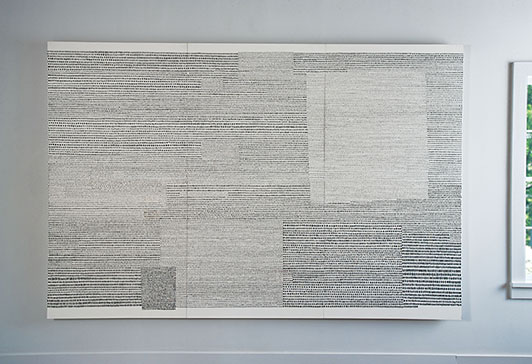
Calculus, Sue Lawty, natural stones on gesso, 78.75″ x 118″, 2010. Photo by Tom Grotta
Sue Lawty
June 16, 11-5pm
The Artworkers Guild, 6 Queen Square, Bloomsbury, London
Woven Tapestry with Sue Lawty”
Website: https://bit.ly/2t3ZZ2J
Susie Gillespie
June 17-21
Yalberton Farm House, Yalberton Road, Paignton, Devon, UK
“Field to Fabric with Susie Gillespie”
Website: selvedge.org
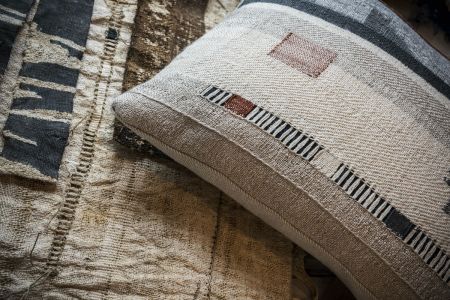
Susie Gillespie Detail
July 30-August 2
South Devon, UK
“Textile Art Techniques: Weaving, Stitching and Dying with Alice Fox and Susie Gillespie”
Website: https://bit.ly/2HJIKc3
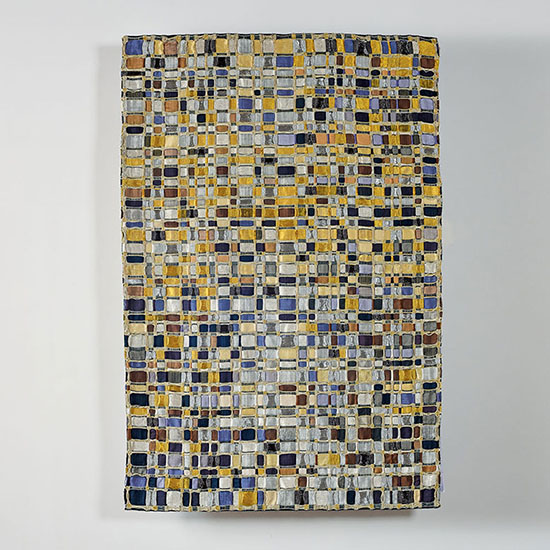
New Nebula, Eduardo Portillo & Mariá Eugenia Dávila, silk,alpaca, moriche palm fiber dyed with Indigo, rumex spp., onion,eucalyptus, acid dyes, copper and metallic yarns, 74” x 49.25”, 2017. Photo by Tom Grotta
Maria and Eduardo Portillo
June 24-July 6
Penland School of Crafts – Textiles Summer Session Three, Bakersville, NC
“Weaving Ideas”
Website: https://bit.ly/2LGP1rB
Carolina Yrarrázaval
July 2
Tama Art Museum, 11th International Shibori Symposium, Tokyo
Talk: “Modern Art Museum Exhibition, Chile”
Website: https://www.11iss.org
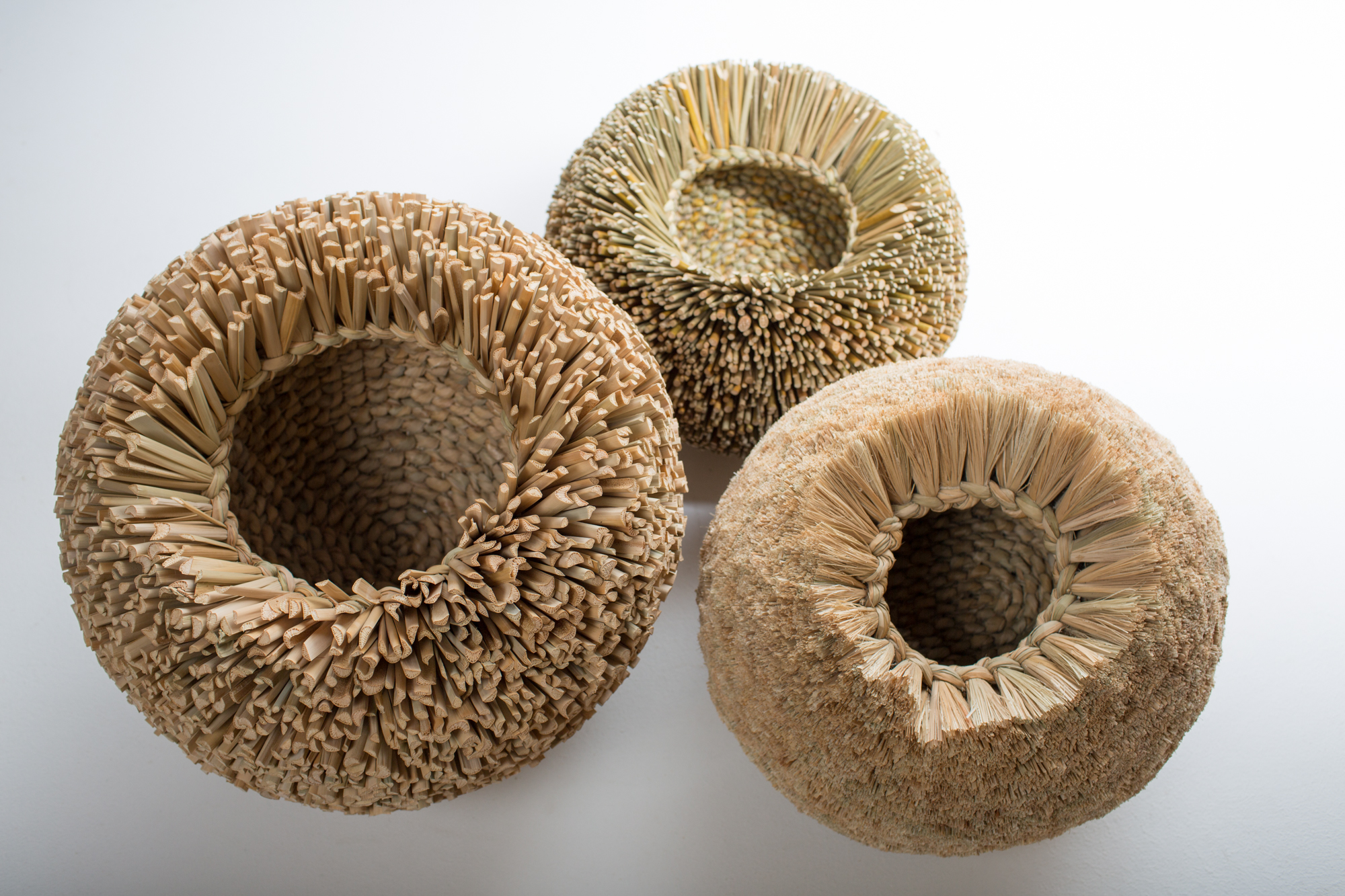
Tim Johnson’s Keeping Time Baskets. Photo by Tim Johnson
Tim Johnson
July 3-4
Järvsö, Sweden
“Finding Fibres – basketmaking with soft materials”
July 16-17, 10-5pm
FlechtSommer – Basketmaking Summer School, Korbmacher-Museum, Dalhausen, Germany
“Looping Techniques with Soft Materials”
Website: https://bit.ly/2JxdOln
July 22 – 27
West Dean College, near Chichester, England
Flexible basketry structures – looping, netting and knotting
Website: https://bit.ly/2y3bblG
Gizella Warburton
July 6 – 8
Hawkwood College, UK
“Presence and Absense”
Website: https://bit.ly
Caroline Bartlett
July 16-18, 10:30-4:30pm
City Lit, London, UK
“Textiles: manipulation, folding and fabric origami”
Website: https://bit.ly/2l3iRv3
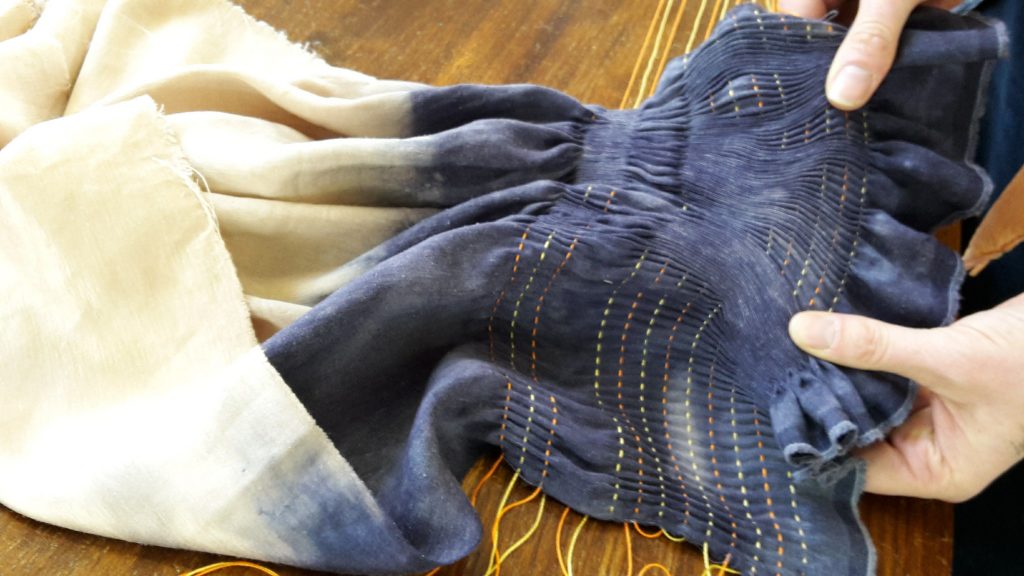
An example of what you can learn at Caroline Bartlett’s “Surfacing: Fold, Pleat, Form”
August 11-17
West Dean College near Chichester, UK
“Reshaping cloth — print and manipulation”
Website: https://bit.ly/2JR0w2w
July 31-August 2
Hawar Textile Institute, Oldeberkoop, Netherlands
“Surfacing: Fold, Pleat, Form”
Website: https://bit.ly/2LFM9Lm
August 27-31
Big Cat Textiles, Newburgh, Scotland
“Between the Folds — Concealing and Revealing with Caroline Bartlett”
Website: https://bit.ly/2JNd4b2
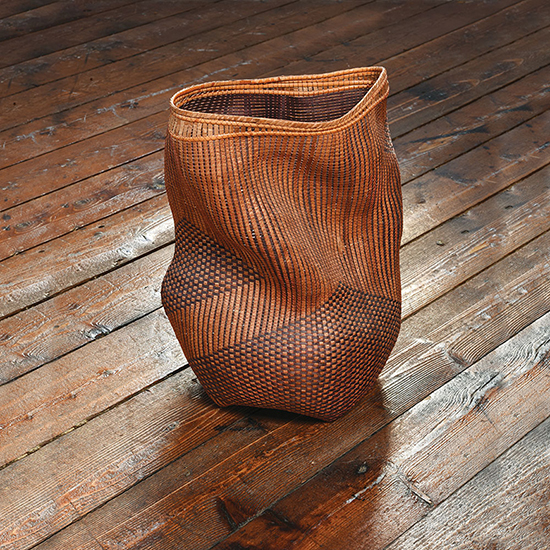
Shady Lane,Polly Adams Sutton,
western red cedar bark, dyed ash, wire, cane
16” x 12” x 9”, 2006. Photo by Tom Grotta
Polly Sutton
August 2-5
Missouri Basketweavers Convention
Talk: August 4, 7pm, “Basketry in Sardinia”
Workshop: August 4-5, “Cedar Knothole Cathead”
August 4, 8am-5pm, August 5, 8am-10am
Website: https://bit.ly/2l6HjvG
Ferne Jacobs
Offering private classes throughout the summer on the fiber techniques of coiling, knotting and twining.
For more information on Jacobs’ offered classes contact her at fernejacobs@gmail.com

Guest Post: David Ling at Haystack School of Crafts, Deer Isle, Maine
photo by David Ling
Nestled into the stoney evergreen clad ledge that seems to slip effortlessly into the atlantic off the coast of Deer Isle Maine, Haystack was to prove a desirable radical contrast to New York City, business and routine.
1000 miles, six ferries, two weeks of glass workshop, 42 haystack meals (in addition to the 10 lobster rolls en route) no cell connection and barely any online connection, the contrast was complete.
photo by David Ling
Initially drawn to haystack for its architectural and landscape setting as well as the reputation I heard over the decades of serving collectors and working with the artisans, I wanted to experience haystack for myself.The link between my architectural practice and haystack is glass. I love glass. With my Modernist Bauhaus background, I grew to appreciate and love glass. Starting with Paul Scheerbart, Bruno Taut, and the Crystal chain letters, glass took on utopian mythical proportions. Studying in Crown Hall, Mies’ glass temple to architectural education, I loved watching how the translucent glass captured light and became a filter for experiencing nature. Later, after starting my own practice, I created glass windows, glass floors, glass ceilings, glass roofs, glass furniture all using
photo by David Ling
tempered, laminated, annealed, acid etched, sandblasted, fractured glass in my work. But that’s where the similarities end. The very physical act of working with glass was to prove radically different from using glass in my architectural practice. I discovered that the very process of blowing glass requires teamwork, physical participation. Working with glass I found, required both focus and a peripheral awareness of my collaborators, heat –and not just any heat but adjusting heat with time in the air, contact with the stainless steel marver, water and wood. I found the luminous fluid quality of molten glass mesmerizing. Streams, puddles and droplets of liquid light.
In contrast to the flat planar architectural applications of glass, I learned through experimentation how glass could take on other qualities in its molten state: elastic, malleable, impervious, explosive, optical. I also started relearning how to experiment, explore and return to a childlike curiosity.
photo by David Ling
While I’m not sure how haystack will affect my future work, I am compelled by not just glass itself but how light and water play with glass. On a personal level I rediscovered child like playfulness, learning to experiment and embracing trial amd error. Collaborating with my classmates was a balletic choreography involving heat and light.
Our instructor Bo Yoon was instrumental in opening my eyes to the unique qualities of glass, not just technique.
As a class, we collectively produced a glass boat, a tree draped in glass strands, mini glass grenades, water filled glass prisms and lenses. One of the most interesting thrusts of Bo’s class and when I was most interested in was the combination of the qualities of glass interacting with water and light. With my rudimentary skills and overwhelming help from Bo, teaching assistants and fellow classmates I produced a diving bell helmet out of class. With an unobstructed view of the underwater world I could bob in the Atlantic coastal waters, listening to my own breathing and waves amplified by the buoyant glass bubble.
David Ling Architect
davidlingarchitect.com